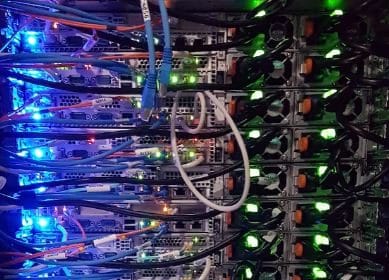House Questions Crypto Mining’s Environmental Impact

WASHINGTON — Four of the largest crypto mining companies are facing questions about their environmental impacts from the House Committee on Energy and Commerce.
“The energy consumption and hardware required to support [proof of work–based] cryptocurrencies may, in some instances, produce severe externalities in the form of harmful emissions and excess electronic waste,” the committee wrote in a letter to the CEO of Nevada-based Marathon Digital Holdings, Fred Thiel, Wednesday. “As one of the largest PoW crypto mining companies operating in North America, we are writing to learn more about the environmental and energy impacts of Marathon Digital Holdings’ … operations.”
Similar letters were sent to the leaders of Texas-based Core Scientific, Colorado-based Riot Blockchain, Inc. and Pennsylvania-based Stronghold Digital Mining asking about the environmental impacts of their companies. This follows the committee’s January hearing where they asked crypto mining company executives about the environmental impact of their businesses.
Committee members were not satisfied with the answers given during the January hearing, especially as news reports show crypto mining relies heavily on the electric grid for power, the committee said in a statement.
Crypto mining isn’t the pick-and-shovels mining of coal or other valuable minerals. Instead, it’s the verification process used to certify transactions on the blockchain ledger, which is the open-source record for these transactions. Verifying information on the blockchain relies on electricity powering the computers.
States like New York have halted some mining operations because of their environmental impact. Earlier this summer the state House and Senate passed a law that would implement a moratorium barring new crypto mining companies from cropping up in the state for the next two years. The governor has yet to sign the legislation solidifying the law.
In the letter to Marathon, the committee leadership referenced a 2020 partnership the crypto mining company made with an aging coal power plant in Montana that was set to be decommissioned.
“Coal-fired power plants account for a disproportionate share of the energy sector’s carbon pollution,” they wrote.
They noted that Marathon announced it would end that partnership, and the committee leadership wants to understand where the power will come from, and if that will be a clean source.
“While it was encouraging to see Marathon’s announcement that it would be phasing out its Montana facility and redeploying its [application-specific integrated circuits] at facilities powered by low- or zero-carbon energy to become carbon neutral, we would like to understand more about Marathon’s plans to phase out this facility and its efforts to ensure it does not take actions moving forward that extend the lifespan of coal power plants,” the committee leaders wrote.
Application-specific integrated circuits are integral to the crypto mining process for the technology used. However, in the crypto mining process, they quickly become obsolete. They are also difficult to repurpose, the committee pointed out.
The committee also asked companies about how they plan to address that potential cause of e-waste.
The questions in each letter probed companies about sourcing their energy supplies, including if they are using renewable energy credits, and future plans for expansion or substitution.
In its letters, the committee specified it doesn’t want to stifle innovation but rather understand how these companies can thrive while addressing environmental constraints.
“Blockchain technology holds immense promise that may make our personal information more secure and economy more efficient,” the four Democratic committee leaders wrote in the letters. “However, the energy consumption and hardware required to support PoW-based cryptocurrencies may, in some instances, produce severe externalities in the form of harmful emissions and excess electronic waste.”
Madeline can be reached at [email protected] and @MadelineHughes






















